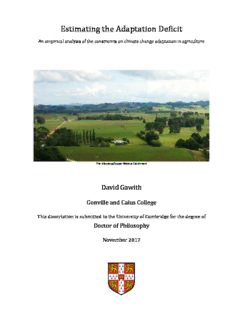
Estimating the Adaptation Deficit PDF
Preview Estimating the Adaptation Deficit
Estimating the Adaptation Deficit An empirical analysis of the constraints on climate change adaptation in agriculture The Hikurangi/Upper Wairua Catchment David Gawith Gonville and Caius College This dissertation is submitted to the University of Cambridge for the degree of Doctor of Philosophy November 2017 Declaration This dissertation is the result of my own work and includes nothing which is the outcome of work done in collaboration except as declared in the Preface and specified in the text. It is not substantially the same as any that I have submitted, or, is being concurrently submitted for a degree or diploma or other qualification at the University of Cambridge or any other University or similar institution except as declared in the Preface and specified in the text. I further state that no substantial part of my dissertation has already been submitted, or, is being concurrently submitted for any such degree, diploma or other qualification at the University of Cambridge or any other University or similar institution except as declared in the Preface and specified in the text David Gawith i ii For my late grandfather, David Gawith (Pa) Who farmed in the Wairarapa hill country and worked hard to pass on a better environment iii iv Abstract Agricultural adaptation to climate change is often simulated by changes in land use over time. Land use is commonly optimised in economic models, which rests on the neoclassical economic assumption of rational choice among farmers. A wealth of experimental and empirical evidence demonstrates that rational choice can be a poor approximation of human decision making. Models simulating adaptation by optimising producers’ behaviour are in effect simulating adaptive potential. Much evidence demonstrates that adaptive potential does not necessarily translate into adaptation. This investigation focuses on the ways by which farmers’ real-world adaptive behaviours depart from those assumed by the dominant economic models of agricultural responses to climate change. These departures are characterised as adaptation constraints, and they are assessed through an empirical case study of adaptive behaviours in the Hikurangi catchment, New Zealand. Data are collected using a mixed methodology comprising an extensive survey of rural decision making, to which this study contributes, and a suite of semi-structured interviews. The interviews give an understanding of the origins and processes of adaptation constraints, while the surveys provide information about the extent to which they impact adaptive propensity. These adaptation constraints are then formalised as mathematical rules and written into an existing agent-based model of land use change, which is substantially modified for the purposes of this study. Different combinations of constraints are then tested in order to produce estimates of their economic impacts. The constraints on adaptation are found to significantly reduce profits relative to a specification that assumes rational choice among farmers. This is understood to be the first empirically derived estimate of the extent of the adaptation deficit. The size of the deficit identified in this study implies that current economic models are likely to significantly underestimate the costs of adaptation to climate change, the benefits of climate change mitigation, and the residual loss and damage climate change will cause. v vi
Description: